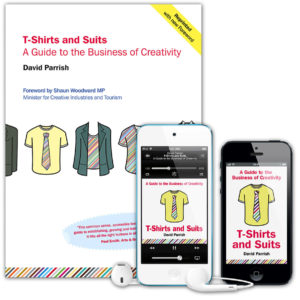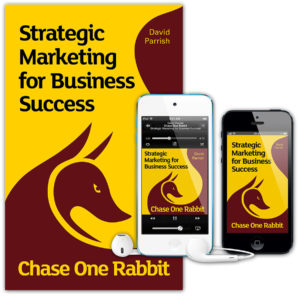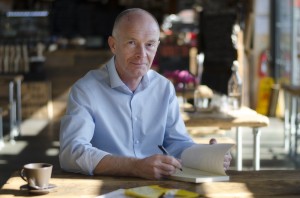Competing effectively involves understanding your competitive advantage in relation to rivals in the marketplace. In other words: You’re creative – but so are they!
In one of my business development workshops for creative entrepreneurs, there were artists, musicians, advertising professionals etc; by coincidence there happened to be three designers in the room. It was interesting to watch their reaction as people in the group introduced themselves. The designers’ reactions were defensive because they each perceived the others as competitors. However, by the end of the day they were good friends, swapping business cards and promising to send customers to each other.
This wasn’t because the workshop magically made competition disappear; it was because they weren’t actually direct competitors in the first place because each had a different speciality. They each had established themselves in a particular market niche and were pleased to be able to send customers to the other, more appropriate, designers.
For example, three very different designers I have worked with are Jonathan Butters (product and industrial design), Mike Carney (graphic design), and Sauce Multimedia (web design).
This phenomenon applies across the creative industries in subsectors such as cultural heritage, performing arts, crafts and music. The more specialist your focus, the fewer real competitors you will have. Yes, the size of the market will be smaller too, but so will the number of suppliers. It’s good to be the biggest fish, even if the pond is smaller. In any case, very few creative businesses need a ‘mass market’ and most would not have the capacity to deal with thousands of customers anyway. “The mass market has been replaced by a mass of niches,” says Jeff Jarvis, author of ‘What Would Google Do?’.
Often, especially in the early years of business, creative entrepreneurs try to appeal to many different types of customer and offer a wide range of services or products. So we see web design companies also offering graphic design, printing services, copywriting, and marketing consultancy. Their theory is that the bigger the net they cast, the more fish they will catch. Actually, the opposite is the case. This ‘jack of all trades’ tactic means that there is always a specialist better than them in every field in which they compete. Being tenth best in ten areas isn’t a clever strategy. Which customer wants to engage the tenth best supplier?
Instead of winning more customers, creative people who try to do everything make things worse by setting themselves up against more competitors, most of whom are better than them in the specialists’ own chosen fields. It’s a recipe for stress and business failure.
This desperate position often prompts people to react by lowering prices to undercut competitors. But competing on price isn’t feasible unless very thin profit margins are counterbalanced by very high sales. It works for commodities such as petrol or beans, but it’s not generally a good idea in the creative sector.
So it’s much better to choose a niche in which you can be top-class and can therefore command a high price.
Clients’ perception of your offering dictates your ‘market positioning’, in other words your place in the market in relation to competitors, as seen from the customers’ point of view. What’s your position? Seth Godin says “If you can’t state your position in eight words or less, you don’t have a position.” Trying to be everywhere is no position to be in!
Like the designers mentioned earlier, if you have a clear and strong position, then others in your field don’t compete with your enterprise but actually complement it. This opens up the possibility of “co-opetition”, a blend of co-operation and competition, which is a strategy of collaborating with apparent rivals for mutual benefit. For example two rival art galleries in Vietnam which competed for the same tourist dollars reframed their local situation and put it in a global context. As a result, Tran Thi Anh Vu (pictured) and a competitor collaborated to set up an online gallery to sell both galleries’ works internationally.
Other creative clusters work on the same principle, ie to combine forces to attract more customers so that everyone wins. In Hollywood, Bollywood and London’s West End, actors come together to play their own specialist part in a bigger picture so that everyone wins.
When you focus on a niche where you dominate competitors, others in similar fields are no longer rivals but instead become ideal collaborators.
Competing effectively
There is more information about competing effectively in David’s books, other publications, videos and free resources.
David Parrish inspires and empowers creative entrepreneurs world-wide as an international creative industries speaker, consultant, trainer and author.
Business Adviser – Creative and Digital Industries
Creative and digital businesses grow with the help of David’s expertise in creative entrepreneurship. He shares his expertise through his speeches, training workshops, coaching and books on business growth.
David advises businesses on strategic development, marketing, leadership and growth in his capacity as a qualified and experienced business adviser and management consultant, working world-wide.
He helps clients by drawing on his own direct experience as an entrepreneur as well as his work helping hundreds of creative, digital, cultural and arts businesses around the world. His direct experience is backed up by academic qualifications and professional accreditations in business strategy, marketing and leadership. He is a Chartered Institute of Marketing ‘Chartered Marketer’. David has an MBA (with distinction). In addition, he is a Fellow of the Institute of Leadership and Management (FInstLM). He is also honoured to be a Fellow of the Royal Society of Arts.
David is a UK expert and international creative industries speaker. He has helped hundreds of businesses in more than 50 countries to achieve greater success on their own terms. This is achieved by using smart business development techniques that fit with their creativity, ambitions and values. His creative industries consulting focuses on the needs of creative industries businesses, cultural enterprises and arts organisations.
Successful creative enterprises integrate creativity and business. David’s T-Shirts and Suits® approach helps creative people (‘T-Shirts’) use smart business thinking (‘Suits’). His entertaining and inspirational speeches illustrate ways in which businesses can use creative business models and powerful business techniques to achieve greater success. His creative industries consulting with individual businesses guides them to success by combining their creative passion, strengths and goals with a winning business strategy tailored to their own needs, values and circumstances.
Creative Business Books, eBooks and Audiobooks
David has written two books and several other publications especially for creative businesses. He brings his own experience of setting up and growing businesses in the creative and cultural industries. David is actively involved in the creative and digital industries as a company director and management consultant. He also shares the learning he has gained from working with hundreds of successful creative enterprises around the world. His books are available in paperback, eBook and Audiobook formats. They have been translated into several languages and published in various countries in several continents.
What they say about David Parrish…
Here are a few examples of what people say about David Parrish. His clients worldwide say how they have benefited from David’s creative industries keynote speeches. They also recommend his business advice, training, presentations, lectures and books:
“It was a pleasure to invite David to give the keynote speech at the Third International Creative Industries Conference in Novi Sad, Serbia. His speech about ‘Creative Business in the Digital Economy’ was enlightening. It was ideal for our audience that included startups, government officials, investors and agencies from Serbia and other countries. David’s speech was also broadcast on TV to reach an even wider audience. We were delighted with the positive impact that David made on the creative industries here in Serbia.”
Tatjana Kalezic. Creative Industries Cluster of Vojvodina KVIK.
http://www.kvik.rs
“The choice to work with David was definitely the right one. In less than two days time we had crafted a cohesive short term and long term strategy that provides for desired growth, protects our IP, enables investment, and allows us to retain creative control of our technology. David’s ability to listen to your situation, to understand it, and then determine a course of action based on your specific needs and goals is rare and a makes David a joy to work with.”
– Aric Wanveer. Zero Gravity Creations LLC, Baltimore, USA
“David Parrish was a special guest of Creative Industries Summer School held in Moscow. Creative entrepreneurs from all over Russia said that David’s presentation was very inspiring, entertaining and very useful for them. His presentation “Creativity and Business: How to Succeed as a Creative Entrepreneur” was amazing and I am sure it will help develop creative entrepreneurship in Russia. David is a very bright and powerful expert.”
– Olga Kizina. Director. Creative Industries Agency. Moscow. Russia.
“Workshop participants were very impressed and inspired by David’s speech and book because he avoided using jargon, gave clear illustrations to describe what creative business is about and explained the general principles of running a creative business. He talked about some important issues, such as intellectual property, business formulas, knowing your competitors, knowing your market, and being prepared to say No.”
– HsinYi Ku. British Council, Taiwan
“David writes about creative business better than anyone I know.”
– Wayne Morris. The Creative Edge. New Zealand.
“David Parrish is a very inspirational speaker. The way he illustrates his points is excellent. He makes you laugh and instantly you start to think about your own ideas and projects.”
– Eli Folkestadaas. British-Norwegian Chamber of Commerce. Oslo, Norway.
Read more testimonials about David’s work as an international creative industries speaker, consultant, adviser, trainer and author of two books, other publications and many articles.
David’s Background, Experience and Expertise
Dave Parrish has been directly involved in the creative economy and cultural economy for more than 20 years, as an entrepreneur, manager, company director, management consultant, business adviser, coach, mentor, trainer, writer, and international creative industries speaker. For an insight into his personal background, business experience, values and his own perspective on creativity and business, read his story.


